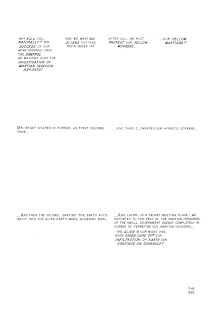
At the time, a couple of people -- including myself -- pointed out that, in this case, the text and the word balloons themselves are acting as art. However, I'll also point out that it's not impossible to come up with a solid example of a comic that would read reasonably well without the art. Here's a random page from Shock Suspenstories #7...

And here's the same page without the art...

Even without the sound effects, and the fact that we're jumping into the middle of a story, it still seems to make perfect sense to me. Conversely, though, here's an example of a comic page with the text and word balloons removed...

It's from Scott McCloud's Understanding Comics and in this sequence, he's discussing nuances of language and imagry. Becuase of the specific nature of what McCloud was trying to do here, we have effectively the same image repeated six times. (Ten times, actually, since the previous page in the book has four more copies of the same panel.) But without the text, does this tell you anything? We see a man standing in front of a painting. He moves his arms a bit, but I don't know that that really conveys a story of any sort.
Or what about a sequence whose textual narrative is disconnected with the imagry depicted? Where a narrator might be telling one story but the imagery is depicting another? The "Black Freighter" sequences from Watchmen, for example...
What I mean to boil this down to is that storytelling is an art, whether you use words, pictures, sounds, gestures, whatever... Comics are a form of storytelling that can, but not necessarily always include pretty pictures and/or flowery language. Comics, despite McCloud's excellent attempt, still defy a concise definition. Or, at least, a generally accepted one.
At some point, comics cease to be comics but the question is: at what point?







0 comments:
Post a Comment